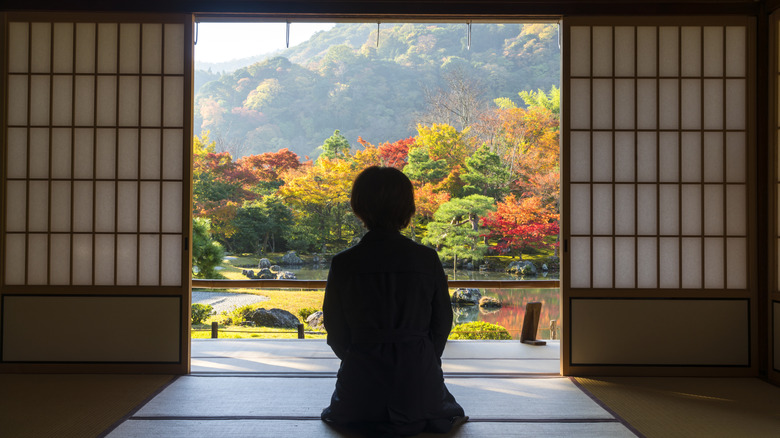Skip The Instagram Fantasy, Here's Where American Expats Really Retire To
It's been swirling around the Internet that the new American dream is to leave America, and expats and wannabe expats are clinging to that idea. The phrase has increasingly circulated on platforms like TikTok and Instagram, where users romanticize starting over again abroad, particularly in Europe. In fact, one expat living in Denmark doesn't just romanticize it; he lays out some of the positives in a Reddit thread: "About 40% of income is taken out as taxes, but at the end of the day my family and I get free healthcare, my children will GET PAID to go to college, I'm guaranteed 52 weeks of parental leave (32 of which are fully paid), and five weeks of paid vacation every year."
European countries often top the list of dream expat escapes. But the truth is more nuanced, and patriots aren't only spending their 401Ks on the Continent. Social media may focus on places like Italy, Portugal, and Spain, but Social Security Administration (SSA) data in 2025 tells a different story. The SSA publishes data on the payments it makes to retirees, including how many of those payments are made to other countries.
While not a perfect way to count where retirees are settling (since many people still maintain a bank account in the U.S. after moving abroad), the data is a good way to show which three countries the most Americans are retiring in. Below, we've broken down the numbers and pulled which destinations took the top spots, so you can start creating your vision boards now for the perfect retirement later.
Mexico
Sunny skies, crystal blue waters, and delectable cuisine make Mexico an attractive retirement destination. After all, many retirees want to feel like they're always on vacation, and in Mexico, that's not hard to do. According to It'll Be Fun – Retire & Roam, 1.6 million Americans reside in the U.S's southern neighbor. The country is attractive to expats for a variety of reasons, but two stand out: its proximity and affordability. Traveling back and forth to see family in the U.S. is easy, and affordability plays a major role in long-term appeal, from day-to-day expenses to healthcare.
International Living Magazine, a publication for expat retirees, mentions that Mexican healthcare is about 50% cheaper than that in America for many medical procedures. Also, housing is considerably cheaper than the U.S. national average. In Mexico, you can buy a home in a comfortable neighborhood for around $150,000; whereas, in the States, the average is more than $350,000 (according to Zillow). To illustrate, $120,500 could buy a small three-bedroom, two-bathroom townhome near Puerto Vallarta. Some favorite expat spots to reside in are Puerto Vallarta (pictured above), Puerto Escondido, and San Miguel de Allende, just to name a few.
Japan
Japan holds the second-largest number of retirees. SSA data shows that over 100,000 international direct deposit payments and over 100,000 direct deposit payments through U.S. banks were made. In December 2024, about 60,000 expat retirees were documented here. According to It'll Be Fun — Retire & Roam, the reason for the expansive American population is that many are ex-military, married to a Japanese national, and under SOFA protections (the Status of Forces Agreement is a treaty between the two nations that grants U.S. military personnel and their dependents access to live in Japan). The estimated total number of Americans is around 115,000, but more than 90% of them are military-related individuals. For civilians, immigration rules make it nearly impossible for outsiders to retire there.
In 2023, the BBC reported that 1 in 10 people is over 80 years old, proving that there is a healthy quality of life in the Asian country. Japanese national health insurance also covers 70% of medical costs, and it is accepted by most hospitals and clinics (via Mailmate). The country is also considered extremely safe, as many children even ride public transportation alone.
The landscape is known for its enchanting beauty. With blooming cherry blossoms, intricately detailed temples, and awe-inspiring mountains, you'll never have to worry about the "best time" of year to visit when you live in a place like this. You may have to worry about natural disasters, like typhoons and earthquakes, but cities like Hokkaido are less likely to be affected.
Canada
The number one place for Americans to retire is another country in North America. Canada often tops the list due to proximity, cultural familiarity, and existing family ties. The country has the most similar culture to the U.S., and there is no language barrier (unlike Mexico or Japan) — unless you are in Québec, but even then, most people speak English as well as French. In Canada, you can explore island retreats with rustic stays, world-class views, and natural beauty, or head into big cities like Montreal or Toronto for an international melting pot of people and vibrant downtowns.
Many retirees enjoy that Canada is both similar to and an escape from America — the same text but a different font, so to speak. Just a short drive across the border, you can experience isolated forests resembling the Pacific Northwest or big cities reminiscent of New York City. However, you'll also face similar problems: Canada has its own affordable housing crisis and healthcare issues to contend with. While healthcare is universal in Canada, that doesn't mean appointments are easy to get, and wait times can be long. But many expats have found ways to iron out the kinks, as SSA data shows more than 70,700 retirees (over 10,000 more than in Japan) were documented in December 2024. As one Reddit user put it, "There is no perfect country, and this is not a utopia. But it has a far better quality of life. I'm never leaving."
Methodology
Islands frequently explores the best countries, states, and cities to affordably and comfortably retire in. Our methodology for selecting the top destinations featured here included federal data from the Social Security Administration that reviews where payments are made to overseas locations. We also used testimonies from Americans who moved out of the U.S. to provide a real-world perspective.
Additionally, we looked at individual cost factors, healthcare, and quality of life issues for each nation. For example, we examined housing prices in Mexico, which are frequently referenced for their affordability. We utilized a mix of federal websites, reputable reports, and retirement-focused publications.




